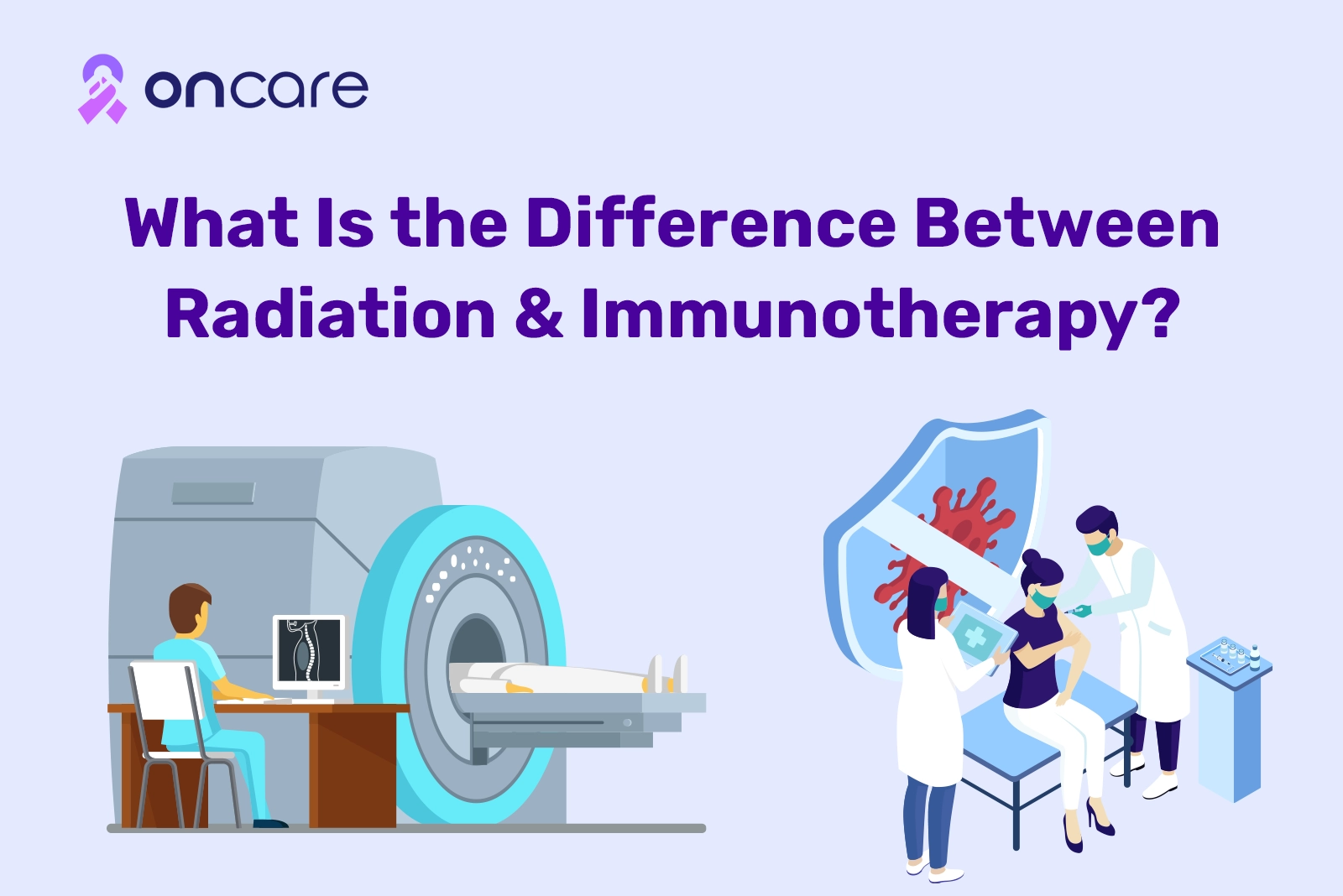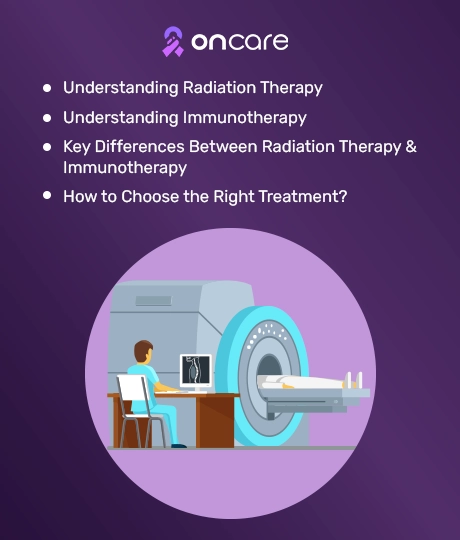What Is the Difference Between Radiation & Immunotherapy?

Selecting the cancer treatment that suits you best may seem like walking through a maze, with many choices and unfamiliar medical jargon being tossed your way. Fear not—we are here to demystify it in plain language. Two major treatment options available for cancer today are radiation therapy and immunotherapy. Although both try to kill cancer, they operate in vastly different manners. Radiation kills cancer cells directly, whereas immunotherapy strengthens your immune system to combat the disease naturally. At Oncare, we offer both immunotherapy and radiation therapy, providing comprehensive treatment options tailored to each patient's needs. This guide explains how each of the treatments works, compares their key differences, and finds out if they can be combined so that they are even more effective.
Understanding Radiation Therapy
Radiation therapy is one of the major types of treatments that are most used in cancer. The high-energy waves or particles are aimed toward the tumor in an attempt to damage and thus kill the cancer cells. The main goal is to ruin their DNA so they will not proliferate or grow again.
There are two primary forms of radiation therapy:
External Beam Radiation Therapy (EBRT)
A machine sending focused radiation from outside the body directs the radiation to the tumor. It is often used for brain tumors, breast cancer, lung cancer, and prostate cancer.
Internal Radiation Therapy (Brachytherapy)
It is when radioactive sources are implanted inside the body close to the tumor. Cervical cancer, prostate cancer, and some cancers of the head and neck are most frequently treated in this way.
At Oncare, we offer both forms of radiation therapy, delivering advanced, patient-focused treatment for comprehensive care.

Understanding Immunotherapy
Unlike radiation therapy, immunotherapy does not target the cancerous cells directly. Rather, it helps the immune system find and destroy the invading cells, such as those found in cancer. The immune system itself is our natural protection against harmful invaders. During these times, however, cancer may be able to evade this surveillance system. Immunotherapy then helps find those hidden threats so they can be destroyed.
Some of the most common forms of immunotherapy are:
- Checkpoint inhibitors: Such drugs inhibit the brakes that keep immune cells from attacking cancer.
- CAR T-cell therapy: T-cells modified in the patient's immune system allow them to identify and commonly destroy the cancer.
- Monoclonal Antibodies: Produced artificially, these proteins are made to recognize cancerous cells, assisting the immune system to destroy them more effectively.
- Cancer Vaccines: They may help teach the immune system to recognize cancerous cells better in higher numbers. These have been employed for the treatment of melanoma, lung cancer, cancers of the bladder, and certain blood cancers.
At Oncare, we provide innovative immunotherapy treatments designed to strengthen the immune system’s ability to detect and eliminate cancer effectively.
Key Differences Between Radiation Therapy & Immunotherapy
Below, we compare both treatments based on several critical factors.
Mode of Action
Radiation therapy is the most effective treatment to destroy other cancers as it works primarily on the DNA of cancer cells, making it impossible for them to proliferate and multiply. While immunotherapy helps the body identify and kill a cancer cell most naturally.
Treatment Area
Radiated treatment involves localized therapy, directed toward a tumor or an affected area. It is ideal, therefore, for those cancers which do not metastasize. In comparison, immunotherapy acts on the entire body and, hence, is effective in cancers that have already metastasized or that are difficult to approach using localized therapy.
Duration & Frequency
Radiation therapy is usually applied daily for several weeks, necessitating many visits to the hospital. It is treated in cycles, mostly every few weeks, giving time for the immune system to react. While radiation offers immediate results, immunotherapy could, by inducing long-lasting immune responses to the tumor, train the immune system to keep fighting cancer.
Side Effects
Radiational damages are usually local, which depends on what area is treated. Skin irritation, fatigue, and damage to nearby organs are among them. The side effects of immunotherapy are most commonly systemic flu-like symptoms. While this may sound rather alarming, it is managed with supportive treatments as well as immune-modulating drugs, and constant supervision. Over time, they typically subside on their own.
Effectiveness for Different Cancers
Radiation is of great help mostly against solid tumors like breast, prostate, and brain cancers; it functions best when most or all of the cancers are confined to only one area. Immunotherapy is rather more effective in blood cancers, melanoma, and advanced-stage cancers that have metastasized or are resistant to standard treatments.
Long-Term Effects and Recovery
Radiation can damage permanent tissue or diminish organ function in treated locations. Whereas immunotherapy may result in immune-related side effects. Both require careful monitoring even after treatment ends. Oncare offers extensive rehabilitation therapies, effective medications, regular follow-ups, and immune-modulating treatments to help control the issues. Our oncologists ensure your symptoms improve or stabilize with their ongoing medical support and you recover quickly, beating the disease.
Cost and Accessibility
Being an ordinary form of treatment for cancer, radiation therapy is easily available and affordable to many, and hence it is covered by most major insurance plans. Immunotherapy, on the other hand, is costly and not always covered. This treatment is only available at specialised cancer clinics such as Oncare, where we assist patients not only through treatment options, but also with insurance coverage and financial aid options.
Can Radiation and Immunotherapy Be Combined?
Yes! They can help each other in improving treatment outcomes in several situations. Radiation targets cancer cells, thereby leading to breaking down of them and their antigens that allow the immune system to get more information on the cancer. This will in turn improve the efficacy of immunotherapy.
This combination therapy is already being used for lung cancer, cancers of the head and neck, and melanoma. However, not everyone is a good candidate for combination therapy. At Oncare, we evaluate each patient separately to determine if they require combined therapy, ensuring the most effective treatment plan tailored to their needs.
How to Choose the Right Treatment?
Cancer treatments cannot be based on a one-size-fits-all approach. Oncologists should decide between radiation and immunotherapy on various grounds:
Type & Stage of Cancer
While radiation may work well, it is more suited to solid tumors in one area, such as those of breast or prostate cancer. Meanwhile, immunotherapy has the upper hand in treating cancers that grow into the next stage, like melanoma or lung cancer.
Overall Health
Radiation is safer for those with autoimmune diseases since it targets only one area. Immunotherapy may worsen autoimmune conditions by triggering an overactive immune response.
Prior Treatments
Radiation is often used after surgery, while immunotherapy is considered if chemotherapy has been used or if surgery isn’t an option. Prior radiation may limit further radiation, making immunotherapy a better choice.
Tolerance for Side Effects
Radiation brings about local consequences such as skin irritation and tiredness, whereas immunotherapy has a spread of systemic side effects like flu-like symptoms or autoimmune issues. Patients who prefer a targeted treatment may opt for radiation, while some may view immunotherapy as offering long-term benefits.
At Oncare Cancer, we customize treatments to each patient’s needs, ensuring the best possible care.
Conclusion
Radiation and immunotherapy, both cancer treatments, work in contrasting ways yet are comparably equally effective. If you don't know which treatment to opt for, let Oncare guide you through the process. We have a multidisciplinary team of oncologists who diagnose and suggest whether to take immunotherapy or radiation therapy, or both, to find the most effective treatment for you. Visit Oncare and consult with our oncologists to embark on a well-informed journey of cancer treatment.